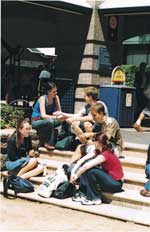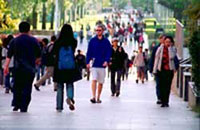|
|||||||
| Faculty Information and Assistance | |||||||
Advanced Standing Computing Information Course Descriptions Enrolment Procedures General Education Requirements Guidelines for Maximum Workload Rules for Progression Cross-Institutional Studies and Exchange Programs Financial Assistance to Students Professional Associates Student Representatives The Law Society
The policy of the School of Law is to grant credit for courses which have been successfully completed in another School of Law where those courses, in the opinion of the School, are equivalent in content and depth to comparable courses at UNSW. Applicants who have completed a full law degree in another country are normally granted credit equivalent to one third of the UNSW degree. All matters regarding credit are at the discretion of the School.
The School of Law manages a multimedia computer laboratory equipped with 30 PCs for instructional purposes. In addition, undergraduate law students have access to a multimedia computer workspace which contains 30 networked computers and postgraduate law students have access to a multimedia computer workspace with 20 networked computers. For printing, smart-card controlled laser printers are available to all law students. Postgraduate research law students have access to dedicated computer workspaces equipped with multimedia computers and printing facilities. All students have access to a range of research tools from the computer desktops including email, online and CD-ROM based national and international legal databases, library catalogues and World Wide Web access. For more information, please refer to the booklet 'IT Resources for Students' or visit the website at www.law.unsw.edu.au
Descriptions of courses offered in 2007 can be found in the Online Handbook at www. handbook.unsw.edu.au
Continuing Students
Continuing students should follow the procedures publicised at the end of the year. New Students New students are informed of enrolment procedures at the time of offer. Full-time Status The majority of Law programs are full-time and require attendance at classes four days per week. Students are reminded that a full-time program is intended for students who devote the principal part of their available time to their program. Any additional commitment, in the form of paid work, training for sport at a significant level of achievement or voluntary work in community organisations, is bound to have an effect on a student's work. Past experience shows that additional commitments beyond 10–15 hours per week almost invariably have an adverse effect on student performance and in some cases have led directly to failure. Students are strongly advised that, if an outside commitment of this order is likely to be maintained consistently over a session, the commitment should be discussed in advance with the Associate Dean (Undergraduate). It should be noted, however, that it is the individual teachers who determine whether outside commitments should constitute grounds for consideration in meeting the requirements of particular courses. Part-time Status Students undertaking the part-time program for Bachelor of Laws are expected to attend classes on two afternoons per week during the academic year, usually between 2pm and 8pm on Day 1 and 2pm and 6pm on Day 2. General Education Requirements Law students enrolled in the Bachelor of Jurisprudence/Bachelor of Laws program must complete General Education requirements. All other law students are deemed to have satisfied the General Education requirement. For detailed information about General Education courses, please see theGeneral Education page.
Guidelines for Maximum Workload The sequence of study for each program is set out under the individual Program entires in this Online Handbook.
Any student wishing to vary their program (law or non-law) by enrolling in a reduced program or in courses which do not conform to the normal sequence, must seek approval from the Associate Dean (Undergraduate). Undergraduate students wishing to overload must submit an 'Overload Request' form at the Student Services Office. Permission can only be given on the basis of a written application in advance of the relevant session. The School of Law uses a range of assessment methods to assess students. These vary from course to course and include formal examinations, takehome examinations, research projects, class participation, essays and moots (mock trials).
Progression in programs is generally dependent on the successful completion of prerequisites and corequisites for courses as listed in the schedules of courses for each program. Students are required to have completed 84 units of credit of core Law courses before enrolling in any elective course. Where the academic record of students is not of a satisfactory standard, the Associate Dean (Undergraduate) may recommend a restricted program. This applies to all undergraduate programs offered by the Faculty. Cross-Institutional Studies and Exchange Programs Students enrolled at UNSW may be permitted to undertake some studies at overseas (exchange) or interstate institutions (cross-institutional studies) provided that they are equivalent in content and depth to comparable courses at UNSW.
Courses which have been successfully completed at another law school (either in Australia or overseas) may be credited to the student's degree up to a maximum of 48 UOC. The School participates in several overseas exchange programs, and encourages students to take advantage of these. Information regarding these programs can be obtained from the International Exchange Office. Students should discuss their plans for cross-institutional studies with the appropriate student advisor in order to determine both their eligibility to undertake such studies and the 'creditability' of the courses under consideration. Financial Assistance to Students
Full-time students in need of temporary financial assistance should be aware of the existence of certain grants and loans sponsored by some Sydney law firms. Students who feel they may need assistance of this type are invited to discuss their requirements on a strictly confidential basis with the Dean.
In addition to full-time teaching staff in the School of Law, each year there are a small number of distinguished members of the legal profession in NSW who work in close association with full-time teachers. They participate in all aspects of the presentation of programs covered by their professional specialisation.
Each year in October up to nine students are elected to membership of the Faculty for the following year. All students enrolled in the Faculty are eligible to stand for election and to vote. Student Members attend School meetings and sit on various Faculty and School Committees.
The UNSW Law Society is the peak representative body for all students in the Faculty of Law. It represents the University at the Australasian Law Students' Association and is considered to be one of the largest and most respected student-run law organizations in the region. Its key objective is to maintain strong relationships between the student body and the Law Faculty, Legal profession and Community.
The Law Society Executives are elected annually. The body consists of a Managing Executive and various Committees led by two Co-Presidents (male and female).The responsibilities of the Law Society fall into four main portfolios:
Membership in the Law Society is automatic for all students enrolled in a Law degree.
Law Society contact details - Room 305, website: www.unswlawsoc.org Home | A Message from the Dean
School of Law - Faculty Information and Assistance | Summary of Programs Australian School of Taxation - Faculty Information and Assistance | Summary of Programs |
|||||||




